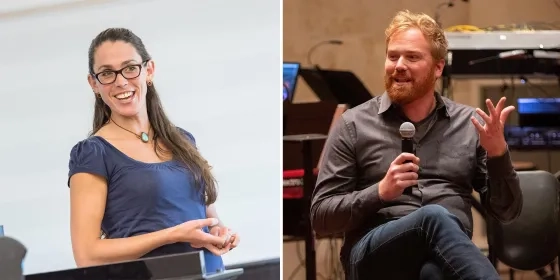California, on the Record with SFCM's Music History Department
Music History and Literature Chair Rachel Vandagriff and Professor Alexander John Stalarow debuted a new course in fall of 2022 showing students another side of the Golden State’s treasured musical past and pushing the curriculum into the 21st century.
If you're a little intimidated by the breadth of California's musical history, SFCM Professors Rachel Vandagriff and Alexander John Stalarow can help with that.
The pair designed and debuted a class in the fall semester with the goal of coming at the state's musical history in a way attuned to the growing diversity of students at the Conservatory. "The undergraduate music history survey students begin to take in their sophomore year had run chronologically through Western European history," Vandagriff explains. "So we had Middle Ages Renaissance, early Baroque, Baroque classical, Romantic, and 20th century music. And I started to feel increasingly uncomfortable teaching that repertoire to our students because they did not feel related to it."
While many voice students at SFCM sing Baroque repertoire, and instrumentalists of all stripes continue to play Bach, Vandagriff continues, for students in the Technology and Applied Composition (TAC) or Roots, Jazz, and American Music (RJAM) departments, "those are not necessarily familiar or relatable stylistic periods to learn about as an entry point to the history. It's a hard sell. And we don't want music history or any academics to be a hard sell. We want to get students excited and curious."
During the first stages of the COVID-19 pandemic and the height of the Black Lives Matter movement in the U.S., Vandagriff said, "it felt even more important to reconsider how Western European-centric the curriculum at the required level has been … It was time to make a change so that our curriculum could represent much more of the musical world that we would like to live in, rather than the status quo that had been true for many decades."
Iconic Bay Area composers like Lou Harrison and Henry Cowell were influenced by sounds from Chinese opera or Javanese gamelan, so the course encouraged students to take that a step further and understand the presence those cultures had in San Francisco. "Those influences are global, but they're also Californian," Stalarow said. Other aspects of the course focus on the Conservatory's history itself: The groundbreaking San Francisco Tape Music Center—an important incubator for legendary composers like Steve Reich, Terry Riley, and Pauline Oliveros—began in SFCM's attic, and the course had students explore the school's archival materials for inspiration. And, as Vandagriff said, "California had a history before it was California, so we wanted to include the indigenous populations of the region and the history of music at the Spanish missions."
Rather than approaching the course with the idea of establishing another canon for students to memorize, Vandagriff and Stalarow conceived the course as "a grouping of case studies, of examples that show specific works related to certain concepts."
"So a concept like identity: How do we as music historians think about the relationship between music-making and identity, be it racial, gender, sexuality?" Stalorow said. "We had a little disco day, and we talked about Sylvester—how as a musician and performer in the Castro, all of that was entangled in what he was doing, that it's music we can understand as both an active form of protest for rights in the queer community, but also as an expression of joy and celebration."
With the inaugural class under their belts, Stalarow and Vandagriff are excited to revisit the course in the fall. "Students want to learn about music from other people that aren't them, that don't look like them, that don't have the same experiences they did," Stalarow said. "And on a broader human level, they were just happy when we got into the specific stories of why musicians would write or play a piece of music and how that might help the student understand who they are, what their identity is."
Learn more about music history and literature studies at SFCM.
